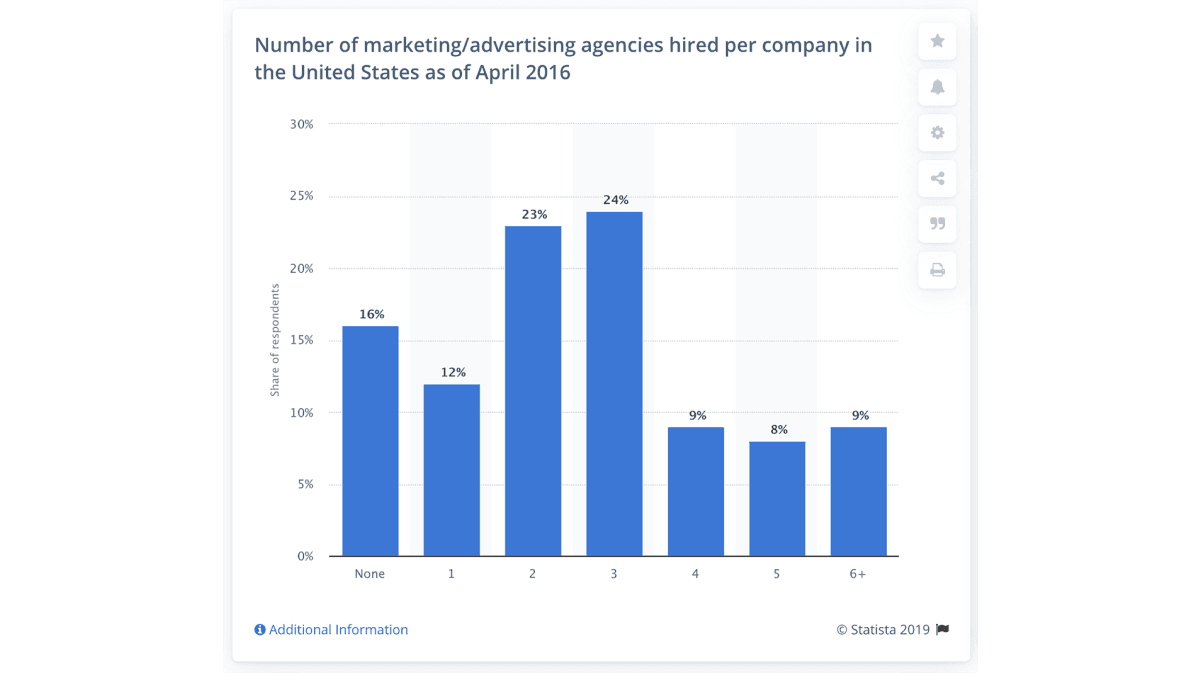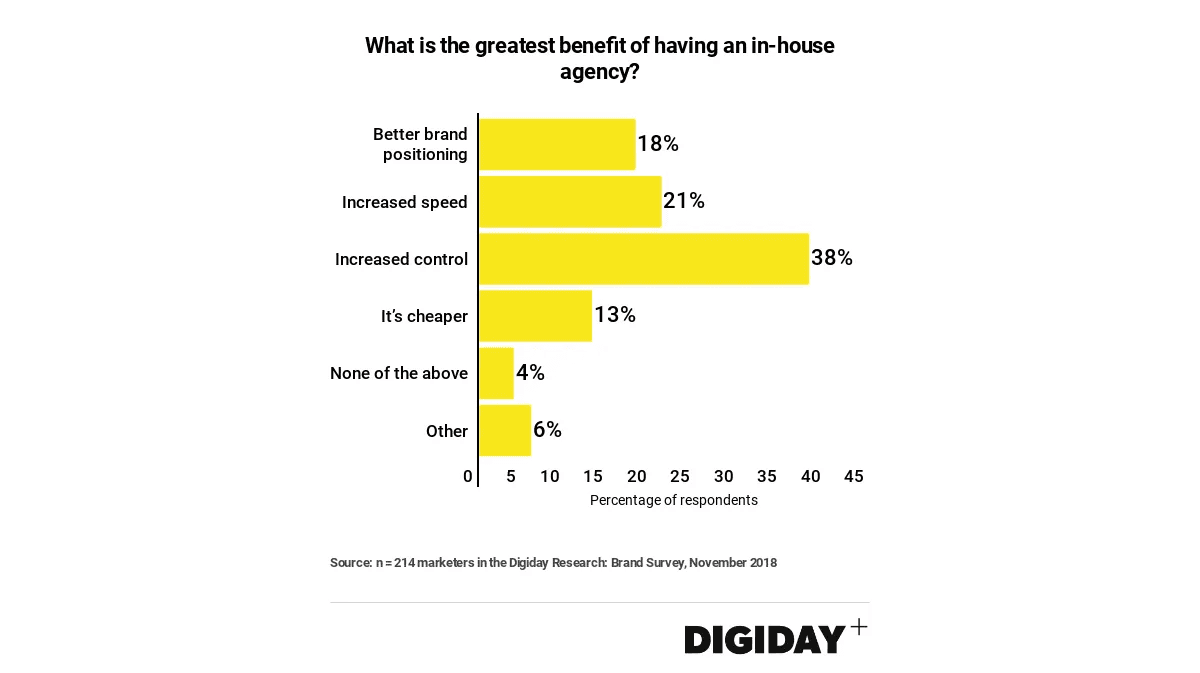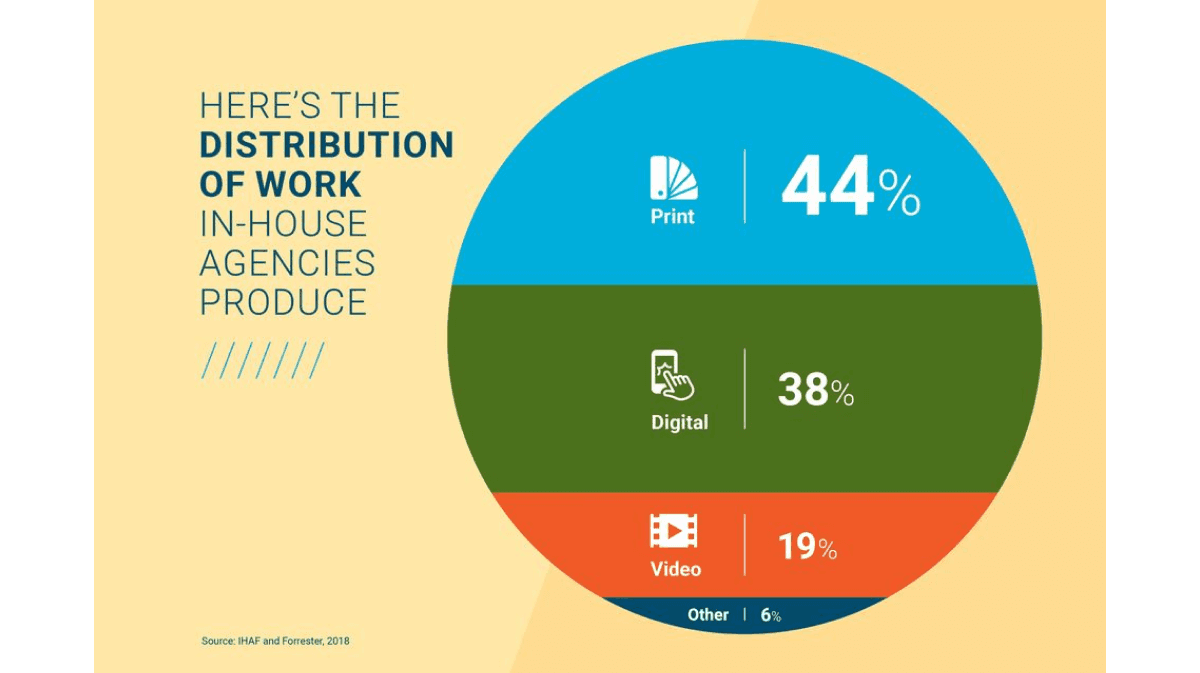Agency vs In-House Marketing Team: Which One Is Better?
Torn between hiring a marketing agency or building a multifaceted in-house marketing team? Here we take a look at the pros and cons of both options.

Nov 04 2019●5 min read

The main difference between an agency and an in-house marketing team is that an agency specializes in a broad spectrum of areas, while an in-house marketing team is only in select fields of marketing.
Got plans to amp up your marketing for 2020? Good for you. But the next question is: how to do it? You’ve basically got two options:
- Build an in-house marketing team
- Hire a marketing agency
Both options have their pros and cons, and both can be a good or a bad choice depending on your business. In this article, we’ll walk through all of those issues here, and show you why your final choice may not have to be as black and white as you’d think.
The Pros and Cons of Building an In-House Marketing Team
In-house marketing generally means that marketing activities are executed by the employees of the company. Marketing teams can vary in size with small companies often having a marketing "team" of one while the average size of a marketing team for a company with 25-49 employees is typically three people. Larger companies with 50-249 employees have an average of eight people doing marketing for them.
In-house teams usually manage both digital and offline marketing, but they do outsource some work. 37% of marketers at small companies (1-99 employees) outsource marketing work, while 56% of medium-sized companies (100-999 employees) outsource some marketing tasks.
Recently there's been quite a hiatus over the news that as much as 91% of brands are moving some part of their marketing operations in-house. Agencies themselves have noticed this trend with companies like the NHL, Getty Images, Electrolux, MailChimp choosing in-house over external resources for some marketing actions.
Here are some other key benefits of building an in-house marketing team:
You have total control over who does the marketing for you, and how they do it.
Integrating your marketing with the rest of your company will be easier when it comes to information sharing, resource sharing, and coordination.
An in-house team may cost less than an ad agency and you won’t have to pay by the hour for your marketing.
There should be less concern about any leaks of competitive knowledge or any leaks of customer data.
You’ll be able to get marketing projects turned around super fast, because you’re the boss and you can control your marketing team’s priorities.
While there are some obvious advantages of having an in-house team, we shouldn't forget that not all marketing actions can be so easily internalized. According to Marketing Charts, "the strategic service most commonly moved is creative (42%), while fewer have moved areas such as media buying (17%) and programmatic (17%)."
Let's look at some other drawbacks of building an in-house marketing team:
You’ll have to find, interview, hire, and onboard these new employees. Then you’ll have to manage the overhead of their salaries and benefits and time off.
In-house marketers may not have a skill set as deep or as broad as agency employees will.
If you need to scale up your marketing program rapidly, you may be slowed down by having to find and hire more employees.
It’s very easy (and common) for in-house marketing teams to get stuck in a rut with creative styles and with marketing strategy.
If a key member of your marketing team quits, your entire marketing program may freeze until you can find a replacement.
According to professionals such as Christa Reed from JobSearcher, hiring a marketing team in-house only makes sense if you have a capable HR department. Otherwise, you're going to run into issues and waste precious time and money.
The Pros and Cons of Hiring a Marketing Agency
Agencies differ depending on the type of service they provide. Marketing agencies tend to offer the broadest spectrum and focus on a consultative approach, whereas advertising, media, PR and other agencies specialize in select fields of marketing.
Pretty much every company will hire an agency at one point or another, and most companies will actually hire several. That’s what data from Statista shows how many marketing or advertising agencies were hired per company in the United States.

This speaks to the level of skill expected from agencies. One of their key benefits is the level of expertise they can deliver – agencies tend to provide specialists. As a result, companies usually hire multiple agencies to do different jobs for them. The classic “agency of record” model seems to be getting phased out.
Benefits of hiring a marketing agency:
Agencies are fluent in the best practices of almost every marketing tactic. They are pros who have worked on dozens, even hundreds of accounts.
An ad agency may be able to work far more efficiently than an assembled in-house marketing team can. Because agencies handle so much work, they have state-of-the-art workflows and processes that are built for volume, efficiency, and quality.
Agencies usually know the best talent around. Want to find the perfect person to create illustrations for a marketing campaign? They’ll be able to pull the perfect person’s number from their Rolodex, whereas your marketing team may take days to find someone who’s even “good enough.”
Agencies will have an easier time delivering fresh ideas, both for marketing tactics and for creative, than an in-house team will have.
Agencies may have access to tools and software that smaller in-house teams can’t afford.
Drawbacks of hiring a marketing agency:
Any agency will have to be brought up to speed about your company’s workflows, approval processes, and culture.
How your agency manages your sensitive company data, like strategic plans, customer files, and other information will have to be defined and then managed.
If you don’t know how to stand your ground, some agencies can get pushy about what they think is best for your marketing.
Sometimes agencies are at risk of wanting to test new, unproven marketing tactics rather than doing old “boring” but proven marketing tactics.
Some agencies can focus on the awards they might win via your campaigns rather than the ROI they might generate for your company.
Agencies can get busy. You may occasionally have to wait several days, or even a week or more for a small deliverable that an in-house marketer could turn around for you in an hour.
How to Make the Decision
As you can see, there are both pros and cons to each option. So how to pick the right one?
Priorities, basically. Every business and business owner or manager has a different order of priorities. For example, if you must have the ability to get marketing tasks done super quickly and with little lead time, that attribute of an in-house team may overcome the hassle of managing employee benefits and vacations.
Or, if you know you need to get a marketing program up immediately, but you’re not sure if you’ll need a full marketing department by even next quarter, then an ad agency is the best choice.
So consider going over the list once more. Read them over with a highlighter in hand, and highlight the three attributes that are a must-have if your marketing program is going to succeed.
Then, go back over the lists again, this time with a black marker in hand. Run that thick black line through the five attributes you’re most willing to let go of.
Keep in mind that your decision doesn’t have to be black and white either. Pretty much every in-house marketing team in the world outsources at least a few tasks. You can hire one or two in-house marketing people, and have them manage and coordinate with an ad agency that does the bulk of your company’s marketing work.
This blending of in-house teams and agencies is happening all over the world. The U.S. Association of National Advertisers recently revealed that 78% of its members had “in-house agencies” in 2018, compared to only 58% having an in-house agency in 2013. That’s a 20% increase in just five years.
Conclusion
Marketing is changing. With automation and outsourcing becoming easier to manage, it’s also more possible than ever for smaller, data-driven teams to get a lot more done than they used to.
Unfortunately, at the very same time, automation and other new marketing technologies require them to constantly develop new skills in order to keep up. That’s where the expertise of ad agencies becomes so valuable, and it may be a way for ad agencies to flourish for some time to come.

WRITTEN BY
Pam NeelyPam is an award-winning freelance content writer with expertise in SaaS, MarTech, and small business marketing companies. A business book ghostwriter in her free time, Pam always writes from a B2B owner perspective.

